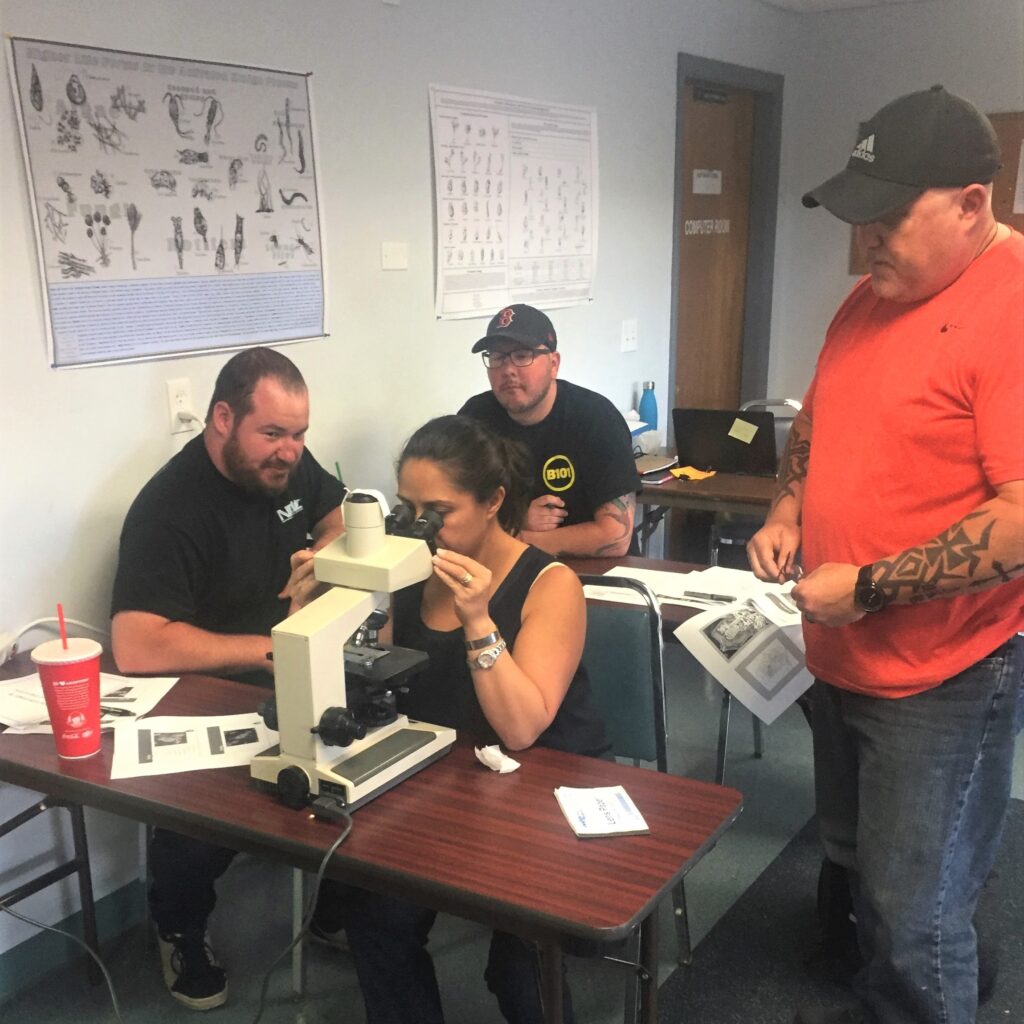By Beth MacBlane
On any given day, one can find Nora Lough peering into a microscope studying bacteria and other microorganisms that underpin the wastewater treatment process.
“Working in wastewater is the best profession in the entire world,” said Nora Lough, biologist II at the Narragansett Bay Commission (NBC) and a training consultant with NEIWPCC’s Wastewater and Onsite Programs Division. “It is challenging and dynamic work, and at the forefront of water quality and environmental protection.”
Lough has worked with NEIWPCC for more than 15 years, developing and leading wastewater trainings on laboratory procedures and microbiology for operators across the Northeast. While life under the microscope may be tiny, microorganisms play a crucial role in the wastewater treatment process, breaking down pollutants and purifying the water. Teaching both virtual and in-person courses, Lough’s classes help wastewater treatment facilities better manage microbial populations in the bioreactor.

She began her career with NEIWPCC teaching a basic laboratory series alongside long-time instructor Charles “Chuck” Conway. Upon his retirement in 2012, she took over the role of leading trainings and onsite workshops across the region – all the while using vacation time from her full-time job at the NBC to pursue this passion.
“I enjoy visiting facilities in-person to see their unique processes and laboratory set-up,” she said. “When I can reinforce the training in the lab, it becomes a great hands-on experience for the students.”
Her trainings include introduction to water and wastewater laboratory, advanced laboratory procedures, and an exam preparation course for the New England Water Environment Association (NEWEA) lab analyst exam. Lough recently launched an advanced laboratory procedures series with courses on quality assurance, analytical and organic chemistry, and alkalinity, cyanide and turbidity.
“Nora is incredibly passionate for educating wastewater professionals on any laboratory procedure that might be needed to keep treatment plants in compliance with their National Pollutant Discharge Elimination System (NPDES) permits,” said NEIWPCC Environmental Analyst Ryan Buckley. “Wastewater labs can be intimidating and complicated, but Nora makes the material easy to understand for professionals of all positions and experience levels.”
Lough develops her own courses with the goal of creating standardized trainings that can be used by other trainers to deliver consistent content. A self-proclaimed perfectionist by nature, Lough goes the extra mile by requesting the class list ahead of time to pull real-world examples from the students’ facilities and permits to make the training more relatable. “I see a lot of the same operators in my classes and have gotten to know them over time,” she said. “I modify the course content to make it as useful and applicable to them and their labs as possible.”
One of Lough’s students, Emily Spring with the Montville Water Pollution Control Authority in Uncasville, Connecticut, said, “The class was so engaging, and it was clear Nora loved the course topic. I enjoy having enthusiastic teachers – the class was in-depth while still being challenging at times.”

Lough found her passion for environmental microbiology while a student at the University of Massachusetts Amherst. She credits the mentorship of Professor Steve Goodwin at the university’s microbiology program that steered her towards this line of study. “I discovered I enjoyed working in the lab,” Lough said. “Not only did I like the hands-on nature of the work, but I also enjoyed seeing a project from beginning to end – from doing the research and benchtop work to reporting and presenting my findings.”
After college, Lough worked at a commercial analytical lab as director of microbiology and quality assurance manager before joining NBC in 2005. In her current role, she ensures that the department and lab run smoothly and satisfy the requirements for the EPA’s NPDES permitting.
Lough believes wastewater laboratory protocols are a growing training component. “As technology changes and improves, we also see more stringent limitations on our permits across EPA Region 1 that really push us to perfect our laboratory procedure limits,” she said. “It is an exciting time for wastewater with all the new procedures and technology.”
Another change Lough has experienced is the expanding role of communication and collaboration between the laboratory and the treatment facility staff. “Throughout my career, I have become more focused on microscopic examinations of treatment facilities,” she said. “This work connects what I am seeing under the microscope directly to what is happening in the wastewater treatment tanks, and has afforded me the opportunity to build relationships with plant operators and superintendents. Being able to give them real-time, usable data so that they can improve their process really drives and excites me.”
Lough is further invested in the wastewater industry by serving on various committees at the state, regional and national level. Through her roles with the Rhode Island Clean Water Association, NEWEA and Water Environment Federation (WEF), Lough applies insights into laboratory topics and trends to help curate training content.
For her work training wastewater operators across New England, the EPA Region 1 honored Lough with the 2018 Regional Wastewater Trainer of the Year Excellence Award. She also received NEWEA’s Clair N. Sawyer Award in 2020 in recognition of her outstanding service to the water industry.
As technology in the wastewater industry continues to progress and develop, Lough intends to keep sharing her expertise on – and enthusiasm for – the powerful microorganisms at the heart of the process with the next generation of operators. “As a life-long learner, I find teaching for NEIWPCC a rewarding aspect of my career. I enjoy seeing my students grow and advance in their careers, and I learn a lot from them, too.”
This article was originally published in the Fall 2024 edition of Interstate Waters magazine. Beth MacBlane is an information officer with NEIWPCC’s Division of Communications and Outreach.